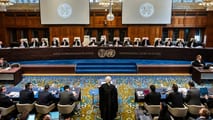Same-sex adoption: hearing before the European Court of Human Rights in teh Gas and Dubois v. France case.
On 12 April 2011 at 9 a.m., the Fifth Chamber of the European Court of Human Rights will hold a hearing on the merits of the closely-watched case of Gas and Dubois v. France (no. 25951/07). The application was brought before the European Court of Human Rights on the 15th of June 2007. It was communicated to the French authorities on the 19th of May 2009 and declared admissible on the 31st August 2010
The case concerns the refusal by the French Courts of a woman’s application to adopt the child that her female partner has conceived by means of medically-assisted procreation. The French courts refused the adoption because it would deprive the biological mother of her rights and parental authority in respect of the child, and therefore, it would run against the child’s best interests.
The applicants complain of the refusal of Ms Gas’s application to adopt Ms Dubois’ child. They contest that this decision has infringed upon their right to respect for their private and family life and was discriminatory, in breach of Article 14 (prohibition of discrimination) read in conjunction with Article 8 (right to respect for their private and family life) of the European Convention on Human Rights.
The applicants complain in particular that Article 365 of the French Civil Code1 laid down a rule which applies only to married couples and not to civil-partners. This rule provides that when the adoptive parent is married to the adoptee’s mother or father, in that case only, the adoptive parent and his or her spouse shall have joint parental responsibility. Considering that marriage is only open in France to couples composed of a man and a woman and that therefore they can not be in a position to adopt the child of their partner, the applicants complains that they are discriminated against. According to the applicants, this would be “indirect discrimination” based on the parents’ sexual orientation and operated to the detriment of the child.
During the procedure on the admissibility, the French Government submitted in vain that the application was inadmissible and incompatible ratione materiae with the Convention because the applicants’ complaint did not fall within the scope of Article 8 of the Convention and of Article 14. In the view of the French Government, the present case concerns an alleged right to adopt as such. It could not therefore be considered to fall within the scope of Article 8.
The Court, ruling on the admissibility, recognized that the provisions of Article 8 do not guarantee either a right to found a family or a right to adopt, and instead adapted the focus of the discussion on the recent concept of “de facto family life” in order to affirm that the relationship between the two applicants and the child may amount to “family life” within the meaning of Article 8 of the Convention. For this purpose, the Court noted that “the existence or non-existence of “family life” is essentially a question of fact depending upon the existence of close personal ties”. It reiterates that the notion of the “family” in Article 8 “is not confined solely to marriage-based relationships and may encompass other de facto “family” ties where the parties are living together outside of marriage”. Moreover, the Court underlined that “sexual orientation” falls within the personal sphere protected by Article 8 of the Convention.
Regarding the applicants complaint of being victims of an unjustified discrimination as created by Article 365 of the Civil Code, the French Government responded that unmarried opposite-sex couple living in a civil partnership under French law could have been met with the same refusal as the applicant, and therefore there is no difference of treatment between couples living in a civil partnership under French law because of their “sexual orientation”. In addition, the Government stressed that the Court’s case-law accepted that marriage confers a particular status on those who entered into it. The absence in domestic law of a right for the applicants to marry was based on legitimate reasons, as was the particular status conferred on married couples, and thus could not be invoked to argue, by extension, that a difference in treatment existed within the uniform framework of civil partnerships. Accordingly, no finding of a difference in treatment could be made in the present case.
Even assuming that there had been a difference in treatment, the Government submitted, on the contrary, that it was justified. The judge’s refusal of the first applicant’s simple adoption application had pursued a legitimate aim, namely the protection of the family based on the bonds of marriage. In this respect the Government stressed that the decision had been based on the child’s interests and not on the first applicant’s sexual orientation. Had the adoption order been granted the biological mother would have lost parental responsibility in relation to her child; this could in no circumstances be considered to be in the child’s interest. Furthermore, in the Government’s submission, the refusal to grant the adoption order had been proportionate to the aim pursued, as it remained open to unmarried couples to request a delegation of parental responsibility in accordance with Articles 377 and 377-1 of the Civil Code.
For the ECLJ, it is clear that there is no right to marriage for same-sex couple under the European Convention of Human Rights (see the recent Schalk and Kopf v Austria ECHR recent ruling), as well as there is no right to adopt or to procreate (see SH v. Austria recent ruling). Without such rights, there can not be any direct discrimination in this case.
As the Grand Chamber of the Court has ruled already, States enjoy a large margin of appreciation in the matter of family law and filiations when dealing with complex legal, moral and social issues, in respect of which there is no generally shared approach among the Contracting States. In X., Y. et Z. v. United Kingdom, of 22 April 1997, a case concerning a transsexual couple, the Court ruled that “Article 8 cannot, in this context, be taken to imply an obligation for the respondent State formally to recognise as the father of a child a person who is not the biological father. That being so, the fact that the law (…) does not allow special legal recognition of the relationship between [the child] and [the parent’s partner] does not amount to a failure to respect family life within the meaning of that provision (art. 8).”2 Again, In its Chamber judgment of the above-mentioned case of Shalk and Kopf v. Austria (24th June 2010), the Court noted that “marriage has deep-rooted social and cultural connotations which may differ largely from one society to another” and found that there is no European consensus on this issue, with only seven of the forty-seven member states allowing same sex marriage. Thus the Court asserted that contracting states were ‘best placed to assess and respond to the needs of society’. Furthermore, the Court recognised that family life extends to same sex couples but there is no obligation on the States to extend marriage under Article 8.
For the ECLJ, the Court needs to exercise “self-restraint” in ideological matters, such as bioethics. Therefore, the Court should respect the doctrine of Margin of Appreciation, recognising that States hold discretion to legislate according to their own social needs and values.”
In the Gas and Dubois case, discrimination may only be discovered through an abusive interpretation of the Convention, using the tools of indirect discrimination and the one of coherence of the legal framework.
The finding of an indirect discrimination would require previously recognizing that the same-sex partner of a child’s parent is a “de facto parent” in a “de facto family”, and that this partner would be in a comparable situation of the parent of a family wishing to establish a legal relationship with the child of his or her spouse. Both realities of family and parenthood would have to become subjective concept. The finding of an indirect discrimination would also require disqualifying the protection of the family composed of a man and a woman, based on the bonds of marriage, as a legitimate aim justifying conferring a particular legal status on those who entered into it, in regard to the child’s couple.
The requirement of the coherency of the legal framework is sometime used in order to bypass the respect for the national margin of appreciation in moral matters. This concept is used by the Court in order to find discrimination in the enjoyment of a right guaranteed by the Convention, notwithstanding the absence of direct violation of that specific right and the wide margin of appreciation enjoyed by the State in this matter. According to this requirement of the coherency of the legal framework, the Courtmayaffirm that once the decision has been taken to allow adoption of the child of the married spouse, and notwithstanding the wide margin of appreciation afforded to the Contracting States in such matters, the legal framework devised for this purpose must be shaped in a coherent manner which allows the different legitimate interests involved to be taken into account adequately and in accordance with the obligations deriving from the Convention.
The requirement of the coherency of the legal framework presupposes once again to consider that the protection of the family composed of a man and a woman, based on the bonds of marriage, as not any more a legitimate aim justifying conferring a particular legal status on those who entered into it, in regard to the child’s couple.
It would be nothing other than a new step in the destruction of the occidental family model, in its legal, social and natural dimensions.
it is no accident that, Gas and Dubois is another case of high interest to certain NGOs – we see similar groups appearing: the International Federation for Human Rights (FIDH), the International Commission of Jurists (ICJ), the European Region of the International Lesbian, Gay, Bisexual, Trans and Intersex Association (ILGA-Europe), the British Association for Adoption and Fostering (BAAF) and the Network of European LGBT Families Associations (NELFA) – representing the homosexual rights lobby, and intervening as third parties in the proceedings. Thus, we are witnessing the latest in a long series of attempts to attack the European common heritage, by introducing new anthropological, moral and social views. It is noteworthy, for example that the International Commission of Jurists (ICJ) was one of the NGO which intervened in the Lautsi and Others v. Italy (so called ‘Crucifix case’, seeking the removal of crucifixes from Italian classrooms.
The European Centre for Law and Justice is an international, Non-Governmental Organization dedicated to the promotion and protection of human rights in Europe and worldwide. The ECLJ holds special Consultative Status before the United Nations/ECOSOC since 2007. The ECLJ engages legal, legislative, and cultural issues by implementing an effective strategy of advocacy, education, and litigation. The ECLJ advocates in particular the protection of religious freedoms and the dignity of the person with the European Court of Human Rights and the other mechanisms afforded by the United Nations, the Council of Europe, the European Parliament, the Organization for Security and Cooperation in Europe (OSCE), and others. The ECLJ bases its action on “the spiritual and moral values which are the common heritage of European peoples and the true source of individual freedom, political liberty and the rule of law, principles which form the basis of all genuine democracy” (Preamble of the Statute of the Council of Europe).
1 Article 365 of the French Civil Code “All rights pertaining to parental responsibility shall be vested in the adoptive parent alone, including the right to consent to the marriage of the adoptee, unless the adoptive parent is married to the adoptee’s mother or father. In this case, the adoptive parent and his or her spouse shall have joint parental responsibility, but the spouse shall continue to exercise it alone unless the couple make a joint declaration before the senior registrar of the Tribunal de Grande Instance to the effect that parental responsibility is to be exercised jointly. ...”
2 X., Y. et Z. c. Royaume-Uni, arrêt du 22 avril 1997, Recueil des arrêts et décisions 1997-II.








